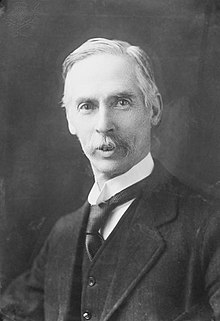This article needs additional citations for verification. (October 2024) |
John A. Hobson | |
|---|---|
 Hobson in c. 1910 | |
| Born | John Atkinson Hobson 6 July 1858 |
| Died | 1 April 1940 (aged 81) Hampstead, London, England, United Kingdom |
| Academic career | |
| Field | |
| School or tradition | Liberal socialism |
| Alma mater | Lincoln College, Oxford |
| Influences | |
| Contributions | |
| Part of a series about |
| Imperialism studies |
|---|
 |
John Atkinson Hobson (6 July 1858 – 1 April 1940) was an English economist and social scientist. Hobson is best known for his writing on imperialism, which influenced Vladimir Lenin, and his theory of underconsumption.[1]
His principal and earliest contribution to economics was the theory of underconsumption, a scathing criticism of Say's law and classical economics' emphasis on thrift. However, this discredited Hobson among the professional economics community from which he was ultimately excluded. Other early work critiqued the classical theory of rent and anticipated the Neoclassical "marginal productivity" theory of distribution.
After covering the Second Boer War as a correspondent for The Manchester Guardian, he condemned British involvement in the war and characterised it as acting under the influence of mine owners. In a series of books, he explored the associations between imperialism and international conflict and asserted that imperial expansion is driven by a search for new markets and investment opportunities overseas. Commentaries on Hobson have noted the presence of antisemitic language and themes in his work, especially in his writing on the Boer War.
Later, he argued that maldistribution of income resulted, through oversaving and underconsumption, in unemployment and that the remedy was in eradicating the "surplus" by the redistribution of income by taxation and the nationalization of monopolies. He opposed the First World War and advocated the formation of a world political body to prevent wars. Following the war, he became a reformist socialist.